Business & Politics
S.Korea-UK upgrade bilateral ties, sign deals on nuclear plants, chips
Samsung’s Jay Y. Lee, Hyundai Motor’s Chung Euisun and other leaders will discuss cooperation with their British counterparts
By Nov 22, 2023 (Gmt+09:00)
4
Min read
Most Read
LG Chem to sell water filter business to Glenwood PE for $692 million


Kyobo Life poised to buy Japan’s SBI Group-owned savings bank


KT&G eyes overseas M&A after rejecting activist fund's offer


StockX in merger talks with Naver’s online reseller Kream


Mirae Asset to be named Korea Post’s core real estate fund operator


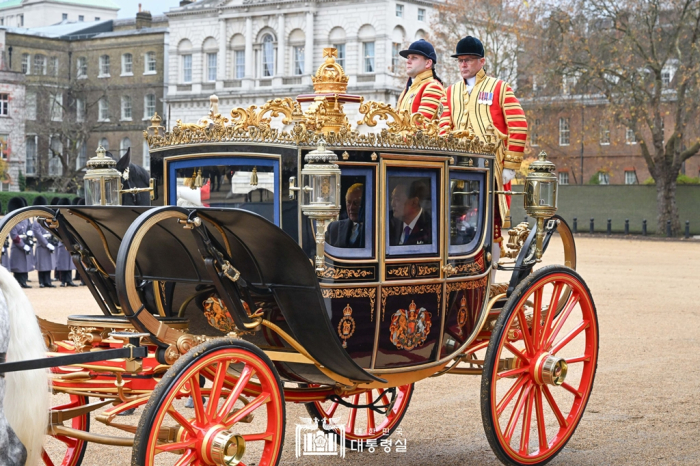
LONDON – South Korea and the UK have agreed to upgrade their bilateral relationship and closely cooperate in the defense, security and business sectors, including nuclear power plant projects.
Korean President Yoon Suk Yeol and British Prime Minister Rishi Sunak will sign the “Downing Street Accord (DSA),” to that end during their summit meeting on Wednesday, Seoul’s presidential office said.
Yoon and Korea’s First Lady Kim Keon Hee on Monday flew to London for a four-day state visit to the UK – the first leg of their two-nation trip that will take them to France later this week for Korea’s final pitch to host the 2030 World Expo in Busan, Korea’s largest port city.
Yoon’s UK trip, the first foreign state visit hosted by Britain since the coronation of King Charles, marks the 140th anniversary of the two countries’ diplomatic relationship.
Under the DSA, the two countries will upgrade their relations to a “global strategic partnership” from the current “broad and creative partnership,” Seoul said.
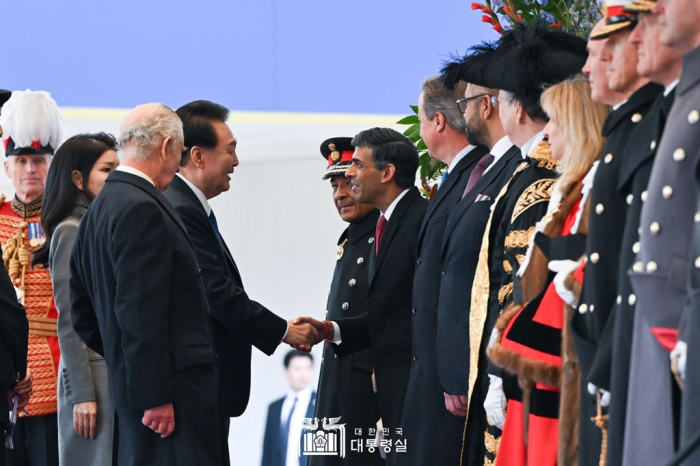
The accord stipulates their common stance on North Korea, including joint military exercises and a push for joint maritime patrols to enforce U.N. Security Council sanctions against Pyongyang, as well as a joint commitment to responding to global issues, including conflicts in Ukraine and the Middle East.
The two countries will also promote cooperation in defense and security sectors by seeking joint weapons exports and sign initial agreements on cooperation in future industries such as semiconductors, artificial intelligence and digital technologies.
Separately, both sides will launch negotiations to revise and upgrade their free trade agreement (FTA), Seoul said.
“The DSA will be the highest-level cooperation between our two nations. We will continue to expand the horizon of our partnership,” said Kim Eun-hye, Korea’s chief presidential press secretary.
NINE MOUs ON NUCLEAR PARTNERSHIP
Korea and the UK said they agreed to strengthen their cooperation in the nuclear energy sector, including the construction of new power plants, by signing nine memoranda of understanding on related projects.
Korea’s Trade and Industry Minister Bang Moon-kyu and his British counterpart Claire Coutinho plan to hold talks to work out details of their nuclear energy cooperation, including the planning, construction, operation and dismantling of nuclear plants.
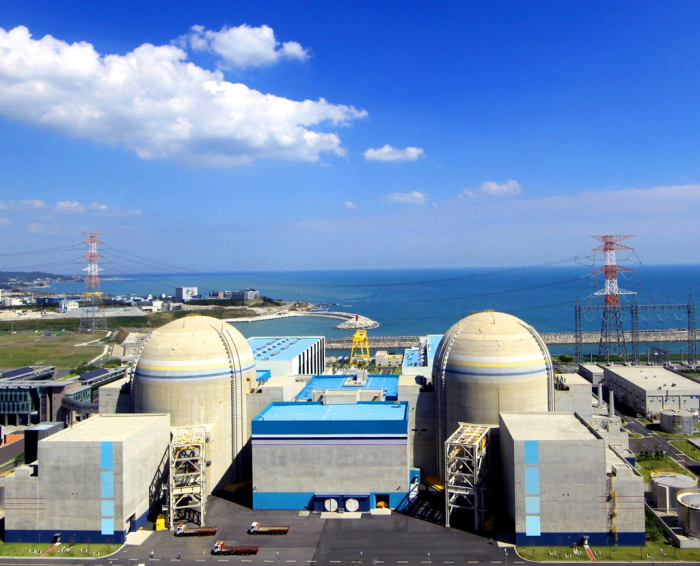
The UK has been aggressively pursuing nuclear energy to have nuclear power account for a fourth of its entire electricity generation by 2050, up from 15% in 2020. The country was the world’s first to commercialize nuclear power by building a plant in 1956.
In early 2017, the state-run Korea Electric Power Corp. (KEPCO) sought to acquire NuGen, the company behind the 15-billion-pound Moorside nuclear project in the UK. KEPCO was named the preferred bidder later that year but lost the deal the following year.
The UK is pushing for eight nuclear plant projects, including Hinkley Point C and Sizewell C, managed by France's state-owned Electricité de France S.A. (EDF).
KOREA-UK BUSINESS FORUM
On Wednesday, President Yoon will participate in a Korea-UK business forum attended by some 200 business leaders from the two countries.
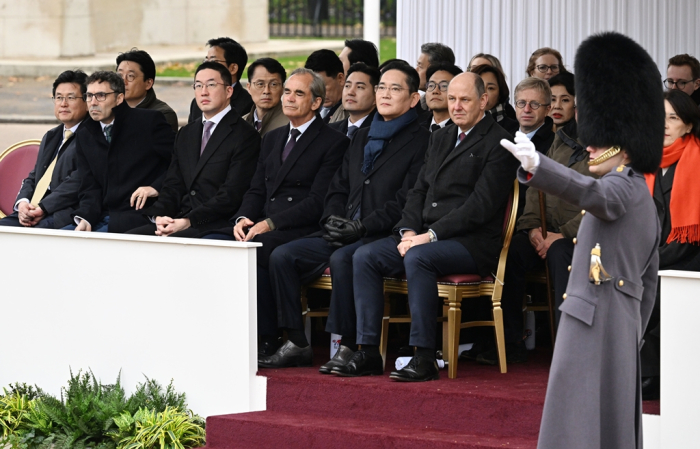
Leading business leaders from Korea attending include Samsung Electronics Co. Chairman Jay Y. Lee, Hyundai Motor Co. Chairman Chung Euisun, LG Electronics Inc. Chairman Koo Kwang-mo, Lotte Group Chairman Shin Dong-bin and Hanwha Vice Chairman Kim Dong-kwan.
From the UK, chief executives of ARM Ltd., a British semiconductor design company, Rolls-Royce, Standard Chartered, Ocado and Rio Tinto are among the participants.
The business leaders will discuss cooperation in high-tech industries, energy, infrastructure, supply chain and finance, officials said.
Hanwha Aerospace Co., Hyosung Heavy Industries Co. and Kyung Dong Navien Co., in particular, are expected to sign deals worth a combined 270 billion won ($209 million) with British firms, they said.
REVISION OF KOREA-UK FTA
The two governments will also begin negotiations to improve their free trade agreement.
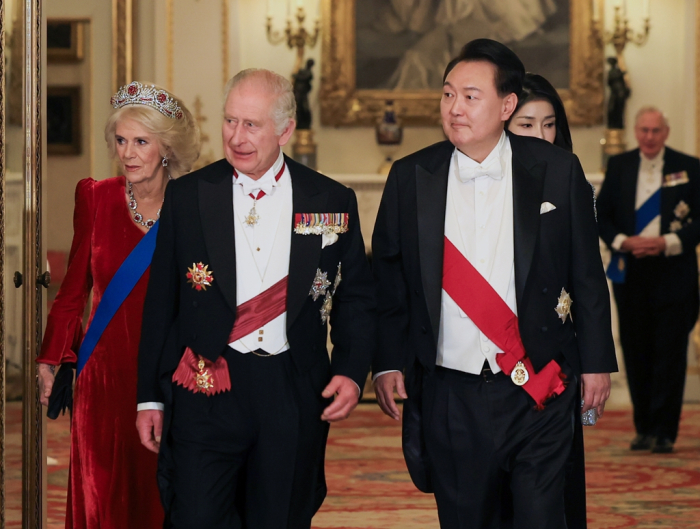
Korean Trade and Industry Minister Bang and Kemi Badenoch, UK’s secretary of state for business and trade, will sign an agreement on Wednesday to start talks on improving their free trade deals.
The new FTA will build on the existing one that was signed in 2019 when the UK was preparing to pull out of the European Union.
Seoul’s trade ministry said it seeks to build a new free trade agreement that reflects changes in the global supply chain and economic security.
The initial Korea-UK FTA focused on opening up markets for goods and services, while the "second-generation” FTA that started in 2010 created fair business conditions for key sectors such as labor, environment and competition, officials said.
Write to Hyeong-Ju Oh and Han-Shin Park at ohj@hankyung.com
In-Soo Nam edited this article.
More to Read
-
 Leadership & ManagementSamsung’s Jay Y. Lee heads to Europe for partner meetup, Busan Expo
Leadership & ManagementSamsung’s Jay Y. Lee heads to Europe for partner meetup, Busan ExpoNov 20, 2023 (Gmt+09:00)
2 Min read -
 Leadership & ManagementHyundai’s Chung: 1st Korean awarded top UK Order from King Charles
Leadership & ManagementHyundai’s Chung: 1st Korean awarded top UK Order from King CharlesNov 15, 2023 (Gmt+09:00)
3 Min read -
 EnergyUS court rules in favor of Korea's nuclear reactor exports
EnergyUS court rules in favor of Korea's nuclear reactor exportsSep 19, 2023 (Gmt+09:00)
4 Min read -
 Mergers & AcquisitionsSamsung’s Lee, SoftBank’s Son to discuss partnership on ARM
Mergers & AcquisitionsSamsung’s Lee, SoftBank’s Son to discuss partnership on ARMSep 22, 2022 (Gmt+09:00)
4 Min read
Comment 0
LOG IN


